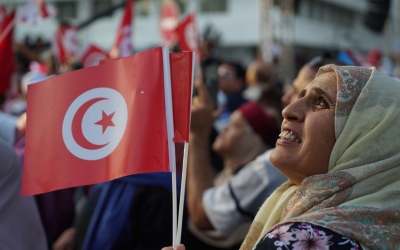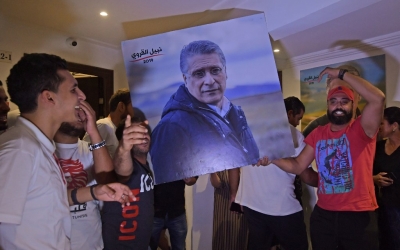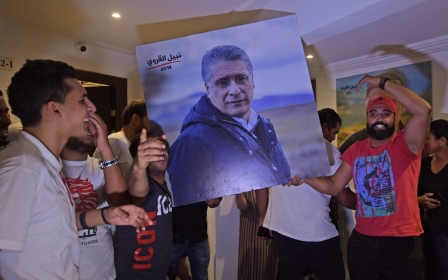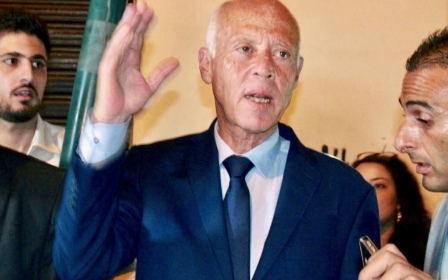Tunisia heading into era of 'stable instability' with fractured parliament
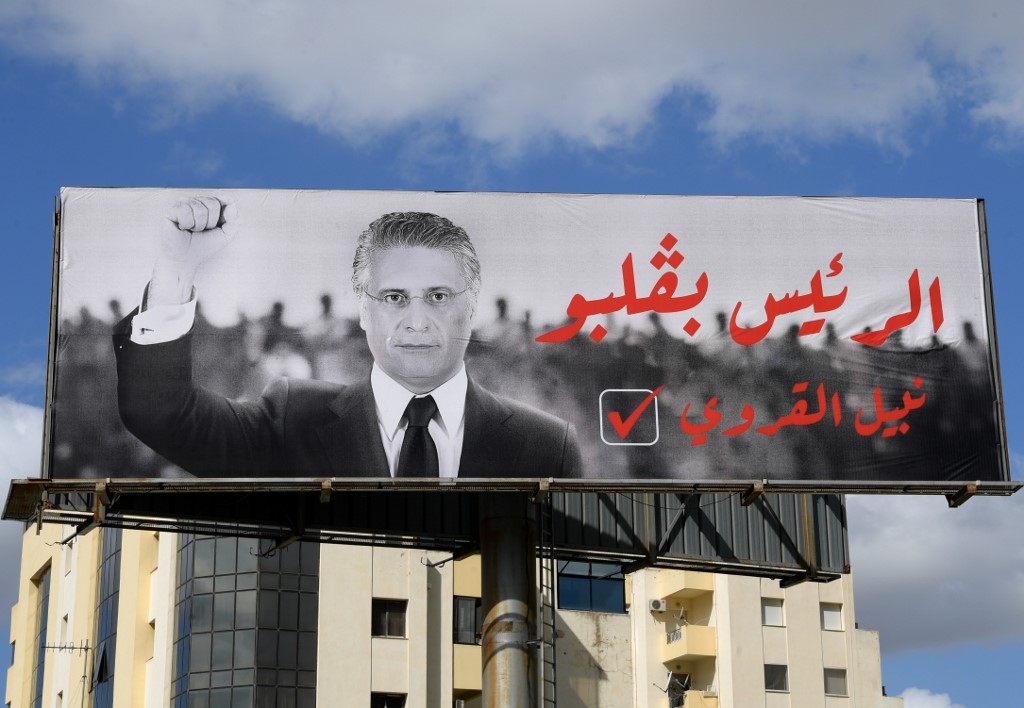
As Tunisians gear up for a new parliamentary scene following legislative elections, commentators fear the future parliament will host a motley of parties that are too small to rule and too large to be ignored, making the country ungovernable.
“Tunisia is heading for a political era of stable instability,” Aziz Krichen, sociologist, writer and former politician, told Middle East Eye.
Preliminary results, announced Wednesday, showed that ruling party Nidaa Tounes faced a wipeout, gaining only 3 seats of the 217 seats in parliament, down by 83. Meanwhile, coalition partner Ennahda has gained the largest number of seats, 52, dropping from 69 seats it had won in the 2014 elections, but is still ahead of the newly established Qalb Tounes party, which came second with 38 seats.
Previous polls predicted a victory for the liberal Qalb Tounes, led by former jailed presidential contender Nabil Karoui, freed Wednesday according to his lawyer.
The preliminary results came “as a very pleasant surprise” to the self-styled Muslim democratic Ennahda party, its programme coordinator Khalil Amiri told MEE.
New MEE newsletter: Jerusalem Dispatch
Sign up to get the latest insights and analysis on Israel-Palestine, alongside Turkey Unpacked and other MEE newsletters
“The election results are good news for us and for Tunisian democracy,” he said, emphasising that his party understands that "Tunisians are tired of identity politics. They want socio-economic changes."
But the 21-year-old Qalb Tounes supporter and political scientist Amine Snoussi, author of La politique des idées (The Politics of Ideas), is disappointed.
“The centrist parties sacrificed their ideology for short-term interests, attacked ‘the big bad Qalb Tounes’ and accepted a deal with the Islamists,” Snoussi said.
Nidaa Tounes, primarily founded in 2012 as a big tent secular alternative to Ennahda, later allied with its rival and has since collapsed into five splinter parties.
One of those, Tahya Tounes, is accused of conspiring with its self-constructed antagonist and has suffered as a result.
The party, launched by ex-member of Nidaa Tounes Prime Minister Youssef Chahed, is now the seventh largest party, with 14 seats in parliament.
According to researcher and philosophy professor Maher Hanin, the old symbolic idea of a nationalist, modernist project espoused by independence leader Habib Bourguiba - once central to the centrist political brand - appears no longer functional.
It has "left both the centrist and the leftist parties politically homeless,” he told MEE.
Mutual repugnance
Qalb Tounes is popular for what Krichen describes as the "I know you are in trouble, so I give you money" policy. The party's leader Karoui provided aid to poor people in neglected regions outside Tunis through his charity organisation Khalil Tounes.
“True. But it’s not only that," Snoussi said.
"There is also a significant group of supporters that believes in Qalb’s project and its ideas for economic development, without relying on foreign resourses like Tahya Tounes and Ennahda.”
However, Amiri says that Qalb Tounes, launched in June 2019, has for years "camouflaged their campaign under the guise of Khalil Tounes' charity activities”.
“That’s one of the reasons why we refuse to form a coalition with them.”
Anticipating a leading position in government negotiations, Ennahda’s leader Rached Ghannouchi has vowed to exclude rival Qalb from coalition forming, referring to charges against Karoui for money laundering and tax evasion.
“Legally people are innocent until proven guilty, but we don’t see them as a credible partner in our fight against corruption,” said Amiri.
This repugnance is mutual.
According to Snoussi, Ennahda and Tahya Tunis have "orchestrated many political manoeuvres abusing the state and justice that no political party can tolerate, such as the arrest of Nabil Karoui,” alluding to widespread accusations that Chahed ordered the arrest.
“Qalb Tounes will not ally with the Islamists,” he said.
Two blocks
With a lineup of seven medium-sized political parties, followed by a large number of small parties, the results will test politicians' ability to put pragmatism before idealism.
“I hardly envision any kind of majority government,” Snoussi said. “In all cases, it will be very fragile.”
Ennahda’s programme coordinator Amiri acknowledged the challenges but expects to find sufficient common ground to build a workable coalition.
“When there is political will, it must be possible to achieve consensus on pivotal topics such as corruption fighting, social justice and socio-economic reforms,” he said.
Whereas Ennahda is winding down its activities in the immediate aftermath of a double presidential and legislative elections campaign, competitor Qalb Tounes has to get up to speed for the upcoming second round of the presidential elections, scheduled for 13 October.
Karoui faces off against independent conservative, nationalist candidate Kais Saied.
Some possible coalition partners, such as Salafist movement Al Karama and Le Mouvement du Peuple (The People's Movement), have emerged over the prolonged campaign period.
“The People’s Movement is an Arab nationalist movement that gained votes by the visibility of Safi Saïd’s presidential candidacy,” explained Snoussi. “Now they support Kais Saied alongside the whole range of nationalist parties, from radical Islamic to extreme nationalist left.”
With the predicted rise of the nationalist parties, Tunisia’s restyled parliament will be divided into two blocks, a block of liberal parties and a block of nationalist parties.
Nationalism on the rise
Besides the economy, Krichen foresees nationalism as a new political trend that will shape Tunisia’s political landscape for the next couple of years.
“The previous government copy-pasted the economic policy of the Ben-Ali regime and kept making debt to the IMF and the World Bank," Krichen said.
"A new generation no longer accepts the devastating consequences for our national economy."
Snoussi said that “a coalition between Ennahda and the nationalist parties should be possible, but in my opinion it remains vulnerable.”
“They won’t reach the 109 seats necessary for a majority government, even with the support of Tahya Tounes,” he added.
According to the election commission, the voter turnout dropped from more than 60 percent in the 2014 elections to 41 percent in 2019, slightly less than the nearly 50 percent achieved in the first round of the presidential elections.
“Tunisians are losing their patience. We are in a hurry to get things done,” Amiri said, calling on all political parties to put their short-term interests aside.
In reaction to the provisional choice of social democratic party Attayar to remain in the opposition, he said: “It’s a pity that some parties already seem to have made their choice.”
For Snoussi, the results are a hard pill to swallow. Qalb Tounes must now “beat Kaïs Saïd without any support from the centre,” he said.
The party's job, Snoussi said, is to defeat Kaïs Said in the upcoming second round of the presidential elections on its own, since "the other centrist parties have proven to be unreliable."
Middle East Eye delivers independent and unrivalled coverage and analysis of the Middle East, North Africa and beyond. To learn more about republishing this content and the associated fees, please fill out this form. More about MEE can be found here.


